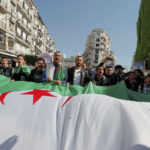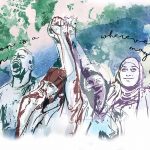Algeria: A view from the streets
The Hirak in Algeria is made up of citizens from all walks of life who are united in the desire to topple the old regime, all its high-ranking officials and associated oligarchs.
Author:
18 April 2019

On 2 April, after five weeks of mass demonstrations against his rule, Abdelaziz Bouteflika, Algeria’s longest-serving president, stepped down.
In a broadcast video, the ailing 82-year-old could be seen sitting in a wheelchair, reading his resignation letter before handing it to the head of the constitutional council. The president of the upper house of Parliament, Abdelkader Bensalah, Bouteflika’s ally, has become interim president for 90 days until new elections are held.
The protests started in February, days after Bouteflika announced that he would run for a fifth presidential term. But as the marches gathered momentum, protesters called for an end to the entire political system ruling the country and the departure of all the figures who served it.
Related article:
After a shady political struggle between the army and the presidential clan, which lasted several days, army chief of staff General Ahmed Gaid Salah, who had backed Bouteflika only days previously, pushed for his resignation.
Though Bouteflika’s resignation speaks to the power of the protests, critics say those who remain in power plan to follow “the system’s agenda” and preserve the same undemocratic institutions.
The night Bouteflika stepped down, protesters filled the streets of Algiers, the capital, to celebrate their victory, but also to call once more for the “end of the system” – the ouster of all high-ranking officials as well as the oligarchs associated with them. Protesters chanted “This is just the beginning” and “They should all go away.”

First step
“Bouteflika’s resignation is a first step. He embodies the system. Now the struggle to build a new Algeria will continue,” said Fares Kader Affak, a 48-year-old actor, activist and founder of the literary café Le Sous-Marin.
Like many Algerians, Omar Farouk Slimani, a 34-year-old lawyer based in Algiers, doesn’t have any illusions. He regrets that Bouteflika leaves behind the same political system, run by Bouteflika’s former allies, with new elections planned within 90 days as specified in the Constitution and without any real political transition.
“We need a change of governance, with the departure of the figures of this system, and we have to hold accountable those guilty of corruption,” Slimani said. On Friday 5 April, he went out once again to protest, to reaffirm his demands.
Bouteflika’s departure has not weakened the Algerian protest movement, called Hirak. According to activists as well as observers, there have been at least as many people in the streets recently as on previous Fridays in March, the day when national protests have been held. New slogans even came out in April: “We said all of them, it means all of them” and “Let’s get rid of the three Bs” (Bensalah, Prime Minister Noureddine Bedoui and constitutional council head Tayeb Belaiz). The army chief of staff was also targeted: “Gaid, get out” and “Gaid Salah, the people are not fooled”.
On 22 February, when hundreds of thousands of people took to the streets in major cities in opposition to Bouteflika’s run for a fifth term, the demands quickly evolved to people calling for the “fall of the system”. “System get out,” they chanted.
Related article:
Bouteflika tried in vain to suppress the demonstrations and mislead the people. He first announced that he would run only for a year and set up a political transition.
Days later, on 11 March, he declared in a public letter that he wouldn’t run for a new term and that the presidential elections would be postponed indefinitely. This meant he’d stay in power.
Bouteflika also said new elections would eventually take place, and a national conference leading to a new Constitution, the framework of which was not detailed, would be held.
An inconsequential reshuffling of Cabinet members then took place, with Bedoui (then interior minister) replacing Ahmed Ouyahia as prime minister.
Bouteflika’s rise to power
Bouteflika has been a leading figure in Algerian politics since the 1960s. At 19, he joined the National Liberation Army (ALN) during the war of independence from France. In 1962, at only 25 years old, he became the minister for youth, sport and tourism in Ahmed Ben Bella’s first government following the war. A year later, he was appointed minister of foreign affairs and for 16 years, until Houari Boumédiène’s death, he was at the forefront of the international stage.
In the 1980s, he lived a long period of disgrace and went into exile after being accused of extortion. But a decade later, he returned to the political arena. And after years of bloody civil war, during which about 200 000 people were killed, he was elected president with the necessary support of the army. He has since been credited, rightly or wrongly, with installing peace and stability.
Since then, he has ruled without political challenge over the oil and gas-rich country, where about 70% of the population is less than 30 years old. Algerian youth have never experienced a political alternative to Bouteflika. They are having tremendous difficulty finding jobs in a society in which corruption is widespread and an economy based on oil and gas revenues prevails.
After suffering a stroke in 2013, Bouteflika only made rare public appearances and his physical presence was even replaced by his portrait, raising more discontent and a sense of humiliation among the populace. On 10 February, when he announced he’d run once more in the presidential elections, he crossed a line and Algerians took to the streets in protest.
Starting point
It all started in Kherrata, a town in the north of the country. On 16 February, people voiced their opposition to Bouteflika’s proposed run. Days later, they tore up and trampled his portrait outside Khenchela’s city hall (in the Aurès mountains). On 21 February, protesters took to the streets in the northeastern city of Annaba. And the following day, after Friday prayers, immense crowds answered an anonymous call on social networks to protest in several cities.
The demonstrations that followed were the biggest the country had seen in decades. They have been peaceful overall, although police forces have used tear gas, sometimes to deter young protesters from getting too close to the presidency. Dozens of people have reportedly been injured in clashes while one man, Hassan Ben Khedda, lost his life after having a heart attack.
“Silmiya, silmya (peaceful),” is a cry that has punctuated the protests. The slogans were bold: “Thieves, you have stolen the country” and “The people want the fall of the regime”, a slogan that was heard in the streets of several Arab countries in 2011.
Some slogans, such as “The only hero is the people”, date back to Algeria’s liberation, “Algeria Free and Democratic!” from the 1980s, or “Power, assassin” to the 2001 protests in the Kabylie region, explained former diplomat and George Washington University professor William Lawrence.
“They [the slogans] are a ‘greatest hits’ of Algerian protests going back to the 1960s,” he said.
The Algerian Hirak has no known leaders, nor has it established any official platform of demands. But it is well organised, with numerous local committees overseeing the crowds.
“I don’t understand the focus on leaders. Why should there be leaders in order for a popular movement to exist?” asked Affak. “There is a collective conscience and the movement is hermetic to any penetration. This is a consequence of previous movements. This way, there is nobody with whom the power will negotiate. This is the difficulty they are facing. There is no interlocutor. This way the movement is protecting itself. We have learned by experience that the power chooses and puts forward people and then negotiates with them.”

The joyful revolution
In Algiers, protests have been banned by decree since 2001. That year, the months-long and heavily repressed Black Spring uprising was born in the Kabylie region after a student was arrested and died in custody. When protesters converged on Algiers, deadly clashes took place. Officially, 126 people died and hundreds were injured during the movement.
In spite of this shadow of state repression, over the past month millions of people have taken back the country’s streets with demonstrations each Friday, drawing people from all social backgrounds and ages. Between the weekly protests, diverse professional groups held their own marches, putting more pressure on the government. Lawyers called for an independent justice system and journalists denounced censorship.
Open discussions on the political situation flourished not only in Algiers but also throughout the country. Universities hosted lively student assemblies, concerts and plays. Activities such as the trashtag challenges were organised, where people share before and after pictures of the spaces they clean up. In Algiers, the Freedom Wall created by university students has been covered by artists and testimonies of passersby.
“This joyful revolution was born out of thousands of marches, protests and demands, which have been expressed years ago. We have gained the necessary experience and maturity to make a revolution that is unique in the world,” said cartoonist Ghilas Ainouche. The Hirak has enlivened his town of Bejaia. Before, he explained, roads were blocked by authorities and activist conferences were forbidden. “Now people are speaking out and this is a good thing.”
Reappropriating the public space
Only hours before Bouteflika’s resignation was officially declared, an unlikely meeting took place outside Algiers’ national theatre. Over a two-hour period, men and women from various backgrounds occupied its stairs to talk about the next steps of their movement.
Many issues were addressed by those who intervened: Does the movement need to choose leaders in the near future? How will they change the country’s institutions? Should they push now for constitutional change? How should they address the inequality between men and women?
A 60-year-old man warned the youth: “Don’t cry victory yet! This is just a crack in the wall. It has not fallen yet. The Hirak, getting out on Fridays, will make the wall fall. The pressure will continue to put pressure and it will fall. When it will fall, the solutions will come and we’ll organise.”
Related article:
Two months previously, this event, initiated by artists in mid-March, would have been impossible to organise and attendees would probably have been forced to disperse. It illustrates the Hirak’s major achievement: The reappropriation of the public space. “That space belongs to the people,” those in attendance stressed, calling for similar debates to be held across the city.
“At the end of each protest, people clean up [the streets and public spaces the protest has crossed]. This is symbolic and it also means that the population will not let go of this reappropriation of the public space,” said Affak.
The result of a long struggle
This apparently sudden freedom of expression wasn’t easily won. The Hirak is the result of a long struggle, stressed Affak. “Previous movements and all the debates on Facebook and social networks around them have made people become aware of their weight and of the necessity to act.”
In the wake of the Arab Spring in 2011, Algeria experienced smaller protests than its neighbours. At that time, however, high prices, rather than politics, made people speak out. Authorities managed to buy social peace by granting financial concessions such as wage increases and by subsidising basic foods.
Three years later, however, in March 2014, in opposition to Bouteflika’s fourth mandate, the Barakat (It’s enough) movementbriefly emerged.
Lawrence draws attention to the “thousands of microprotests” that take place each year and are not heard about.
“In Algeria, civil society does not operate much around organisations but around groups with shared grievances that may not be part of an active organisation or an organisation of which they would consider themselves a member. When Algerians protest about housing, healthcare, education, environment, employment or any other issue, they often conceive of this as direct action vis-à-vis the state or local authorities. The street and the regime have a direct conversation,” he explained.
Arrests
In the first days of the movement, several protesters were arrested, including a dozen journalists. Most were released after a few hours and without any charges. But according to Amnesty International, at least 20 people are being accused of participating in “unarmed gatherings” and are scheduled to appear in court in May.
Mohamed, a 23-year-old journalism student and member of the Democratic and Social Movement party, says he has been arrested twice. On 22 February, before the protest started, the police detained him with a friend for three hours. Three days later, he went to Place Maurice Audin, where people have rallied in past weeks. There, he says, the police started beating up protesters as they arrived. He was taken to the police station and held there for more than 10 hours.
One man expressed his opposition to Bouteflika too soon. Hadj Ghermoul, an unemployed 37-year-old from Mascara, a city in the northwest, was arrested and detained in January and is serving a six-month sentence for having published a picture with a sign that said “No to the fifth mandate” on Facebook.
As the political situation evolves, activists are once again highlighting his case, claiming that he is the first protester of the Hirak and that millions of people have since been guilty of the same deed. They say the right to protest is guaranteed in the Algerian Constitution.
In spite of these arrests, the repressive state machine has been put on hold. In mid-March, the protesters received a major supportive push from judges when they decided to support the Hirak and joined lawyers to call for an independent judicial system. They declared that they would refuse to judge peaceful protesters should they be arrested and brought to court. This move makes it impossible, for now, for the government to resort to widespread political detention.
Legislative support
Before the judges took a stand, lawyers ardently supported the movement, marching throughout the country wearing their robes.
“Normally, the elites go out and the people follow, but this time in Algeria the elites hadn’t been bold. It is the people who gave us the courage to do that,” said lawyer Hafid Tamert. “We are going to continue to do that, to say that our problem isn’t only Bouteflika but his entourage. We cannot build a new Algeria with them.”
Ainouche is part of a generation who was marked by state repression in 2001 during the Black Spring.
This movement is different, he says. “It takes place nationwide and we’re all together. No matter our language, colour, religion, political beliefs … we are all united for the first time since our independence to tell the system which has been in place since: ‘Get out.’”
Ilhem Rachidi is a freelance reporter based in Morocco. Rachidi has written extensively on protest movements and human rights issues, publishing articles in the French newspaper Mediapart (where she has worked as a correspondent for four years), Rue89,Al Monitor and The Christian Science Monitor.
This article was first published in Toward Freedom.



